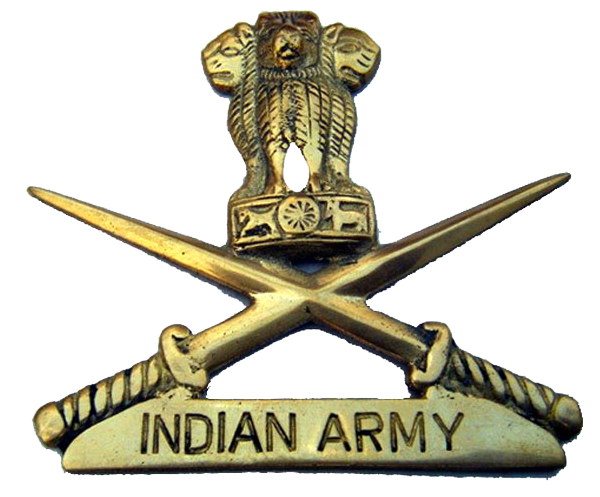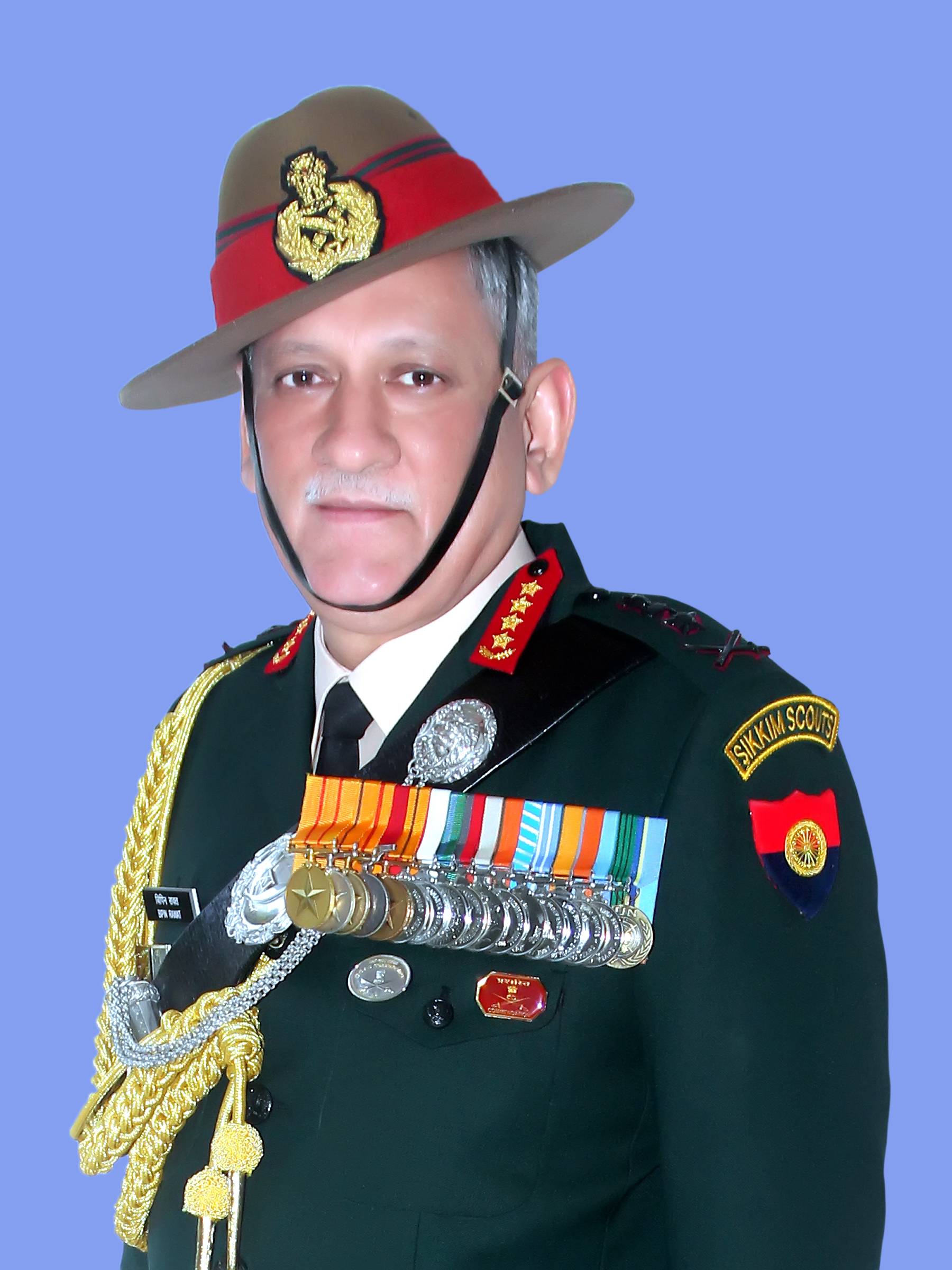 INDIAN ARMY
INDIAN ARMY

General Bipin Rawat, PVSM, UYSM, AVSM, YSM, SM, VSM, ADC is the 26th Chief of Army Staff of the Indian Army. He assumed office on 31 December 2016 after retirement of General Dalbir Singh.
Bipin Rawat was born in Pauri Garhwal district, Uttarakhand, India.His family had been serving in the Indian Army for multiple generations, and his father was Lieutenant General Laxman Singh Rawat.Rawat attended Cambrian Hall School, Dehradun, St Edward’s School Shimla, National Defence Academy Khadakwasla and the Indian Military Academy, Dehradun, where he was awarded the 'Sword of Honour'. He is also a graduate of the Defence Services Staff College, Wellington and the Higher Command Course at Fort Leavenworth, United States. He has a MPhil in Defence Studies from Madras University, a Diploma in Management and another in Computer Studies. In 2011, he was awarded a Doctorate of Philosophy by Chaudhary Charan Singh University, Meerut for his research on military-media strategic studies.
Rawat was commissioned into the 5th battalion of 11 Gorkha Rifles on 16 December 1978, the same unit as his father.He has lots of experience in high altitude warfare and spent ten years conducting counter insurgency operations.[10] He commanded a company in Uri, Jammu and Kashmir, an infantry battalion in the Eastern sector along the Line of Actual Control at Kibithu, 5 Sector of Rashtriya Rifles (Sopore) as brigade commander, 19 Infantry Division (Uri), III Corps (Dimapur) and was General Officer Commanding-in-Chief (GOC-C) Southern Command (Pune). He also held staff assignments which included an instructional tenure at the Indian Military Academy (Dehradun), General Staff Officer Grade 2 at the Military Operations Directorate, logistics staff officer of a Re-organised Army Plains Infantry Division (RAPID) in central India, Colonel Military Secretary and Deputy Military Secretary in the Military Secretary’s Branch and Senior Instructor in the Junior Command Wing.
He also commanded MONUSCO (a multinational brigade in a Chapter VII mission in the Democratic Republic of the Congo) where he was twice awarded the Force Commander’s Commendation. During his career span of 37 years, he has been awarded for gallantry and distinguished service with the UYSM in 2013, AVSM, YSM, SM, VSM, COAS Commendation on two occasions and the Army Commander’s Commendation.
He is also the honorary General of Nepalese Army as It has been a tradition between the Indian and Nepali armies to confer the honorary top rank on each other's chiefs to signify their close and special military ties.
While commanding MONUSCO (a Multinational Brigade in a Chapter VII mission in the Democratic Republic of the Congo), Rawat had a truly outstanding tour. Within two weeks of deployment in the DRC, the Brigade faced a major offensive in the east which threatened not only the regional capital of North Kivu, Goma, but stability across the country as a whole. The situation demanded a rapid response and North Kivu Brigade was reinforced, where it was responsible for over 7,000 men and women, representing nearly half of the total MONUSCO force. Whilst simultaneously engaged in offensive kinetic operations against the CNDP and other armed groups, Rawat (then Brigadier) carried out tactical support to the Congolese Army (FARDC), sensitization programmes with the local population and detailed coordination to ensure that all were informed about the situation and worked together in prosecuting operations whilst trying to protect the vulnerable population.
his hectic period of operational tempo lasted a full four months and during this time Rawat, his headquarters and his international Brigade, were tested to the full, across the operational spectrum. His personal leadership, courage and experience were pivotal to the success that the Brigade achieved. Goma never fell, the East stabilized and the main armed group was motivated to the negotiating table and has since been integrated into the FARDC. He was also tasked to present the Revised Charter of Peace Enforcement to the Special Representatives of the Secretary General and Force Commanders of all the UN missions in a special conference at Wilton Park, London on 16 May 2009.
1. Ensure the highest standard of operational preparedness to meet present and emerging challenges.
2. Ensure force modernisation incorporating relevant contemporary technologies.
3. Make up critical deficiency of weapons and equipment at the earliest.
4. Develop requisite capacities and infrastructure with special emphasis on our Northern and NE Borders.
5. Enhance inter service jointmanship at all levels in letter and spirit.
6. Ensure the highest level of security consciousness amongst our rank and file.
7. Optimally enhance Human Resource Development to fully exploit the inherent strength of the Indian Army.
8. the quality of life and living conditions of all ranks with special emphasis on the soldier.
9. Foster an organisational climate based on mutual respect and camaraderie amongst all ranks.
10. Ensure requisite welfare measures for ex-servicemen and Veer Naris.
1. No Rape.
2. No Molestation.
3. No torture resulting in death or maiming.
4. No Military disgrace. (loss of arms, surrender, loss of post or imbibing of an un-army like culture).
5. No meddling in the Civil Administration (i.e. Land disputes or quarrels).
6. Competence in platoon/company tactics in counter insurgency operations.
7. Willingly carry out civic actions with innovations.
8. Develop media interaction modus. (Use it as a ‘force-multiplier’ and not as a ‘force-degrader’).
9. Respect Human rights.
10. Only fear God, Uphold Dharma (Ethical mode of life-the path of righteousness) and enjoy serving the country.